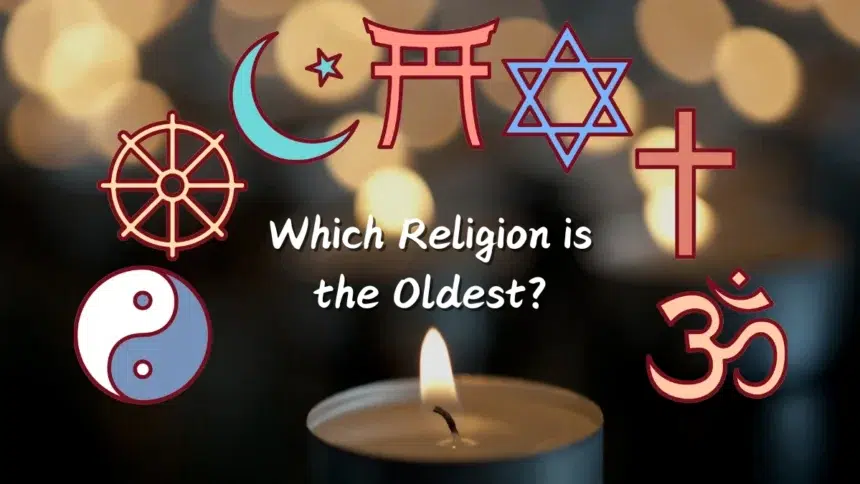Introduction
Religions have shaped human history for millennia, deeply influencing cultures, societies, and individual worldviews. But which religion is the oldest? This question has sparked curiosity and debate among historians, theologians, and scholars for generations. In this article, we’ll explore the Oldest Religions in the World, their origins, and how historians determine the age of these ancient faiths. Is it even possible to pinpoint the oldest religion with certainty? Let’s dive into the complexities of this fascinating topic.
What is the Oldest Religion?

Determining the Age of Religions
Pinpointing the oldest religion is a challenging task for historians and scholars. Unlike physical artifacts, religions often evolve through oral traditions, rituals, and written scriptures. When determining the age of a religion, scholars rely on several methods, including:
- Archaeological Evidence: Ruins of ancient temples, religious artifacts, and sacred sites.
- Ancient Texts: Documents such as the Vedas, Torah, and religious manuscripts that offer insight into early religious practices.
- Oral Traditions: Stories and beliefs passed down through generations often predate written records.
However, determining a religion’s exact age is complex due to the evolution of belief systems. Many religions today have roots in earlier practices that may not have been formally recognized as religions. Furthermore, ancient civilizations had overlapping belief systems, making it difficult to single out the “first” or oldest religion.
The Complexity of Pinpointing the Oldest Religion
One major challenge is that different religions often claim to be the oldest. While one religion might have its sacred texts dating back thousands of years, another might have oral traditions that are even older but were only written down later. Additionally, many ancient religions, like those practiced by early humans, left no written records. This makes identifying the world’s oldest religion even more difficult.
With this context in mind, we’ll explore the top 10 oldest religions in the world, acknowledging that these belief systems have deep, intertwined histories.
Top 10 Oldest Religions in the World:
Hinduism (Circa 2000 BCE – 1500 BCE)
Often regarded as the world’s oldest religion, Hinduism originated in the Indian subcontinent and is deeply rooted in the ancient Indus Valley civilization. The religion’s sacred texts, the Vedas, date back to around 1500 BCE and are among the oldest religious texts known to humanity.
Beliefs: Hinduism centers around karma, dharma, and reincarnation. Its pantheon of gods and goddesses and its intricate rituals have profoundly influenced the development of religious practices in South Asia.
Zoroastrianism (Circa 1200 BCE)
Zoroastrianism, founded by the prophet Zarathustra (Zoroaster) in ancient Persia, is one of the oldest monotheistic religions. It predates both Christianity and Islam.
Beliefs: Central to Zoroastrianism is the concept of dualism, which involves a constant battle between the forces of good (represented by Ahura Mazda) and evil (represented by Angra Mainyu).
Judaism (Circa 1800 BCE)
Judaism, one of the ancient religions, traces its origins to the patriarch Abraham around 1800 BCE. It is the first known religion to promote monotheism — believing in a single God.
Beliefs: Jewish religious life is guided by the Torah, which includes the first five books of the Hebrew Bible. Judaism emphasizes the covenantal relationship between God and the Jewish people.
Shinto (Circa 1000 BCE)
Shinto is the indigenous religion of Japan, deeply intertwined with Japanese culture and history. Though it has no founder or sacred text, it is considered one of the oldest religions.
Beliefs: Shinto revolves around worshipping kami (spirits) and natural elements. Shrines are built to honor these spirits, reflecting a deep connection with nature.
Jainism (Circa 800-600 BCE)
Founded by Mahavira, Jainism originated in India around the 6th century BCE. However, its spiritual lineage is believed to be much older, making it one of the oldest religions in the world.
Beliefs: Jainism emphasizes the principles of non-violence (ahimsa), karma, and the path to spiritual liberation. Jain monks practice strict asceticism.
| Religion | Approximate Origins | Current Followers |
| Hinduism | 2000 BCE – 1500 BCE | 1.2 billion |
| Zoroastrianism | Circa 1200 BCE | 100,000 – 200,000 |
| Judaism | Circa 1800 BCE | 14 million |
| Shinto | Circa 1000 BCE | 4-5 million |
| Jainism | Circa 800-600 BCE | 4-5 million |
| Buddhism | Circa 6th Century BCE | 520 million |
| Taoism | Circa 500 BCE | 12 million |
| Confucianism | Circa 500 BCE | 6 million |
| Ancient Egyptian Religion | Circa 3000 BCE | Extinct as a formal religion |
| Greek Polytheism | Circa 2000 BCE | Extinct as a formal religion |
Buddhism (Circa 6th Century BCE)
Founded by Siddhartha Gautama, later known as Buddha, Buddhism emerged as a reform movement from Hinduism in ancient India.
Beliefs: Buddhism’s core teachings revolve around the Four Noble Truths and the Eightfold Path, which guide individuals toward enlightenment and liberation from the cycle of rebirth.
Taoism (Circa 500 BCE)
Taoism emerged in China during the 6th century BCE, attributed to the sage Laozi, author of the Tao Te Ching.
Beliefs: Taoism emphasizes living in harmony with the Tao (the way), the underlying principle of the universe, through simplicity and mindfulness.
Confucianism (Circa 500 BCE)
Founded by Confucius in ancient China, Confucianism is more a philosophy than a religion, focusing on ethics, morality, and social harmony.
Beliefs: Confucian teachings stress respect for elders, loyalty to family, and the importance of education in achieving a just and orderly society.
Ancient Egyptian Religion (Circa 3000 BCE)
One of the earliest ancient religions, the polytheistic beliefs of the ancient Egyptians revolved around gods like Ra, Osiris, and Isis. They believed in the afterlife and built grand temples and pyramids as part of their religious practices.
Greek Polytheism (Circa 2000 BCE)
The ancient Greeks practiced polytheism, worshiping a pantheon of gods, including Zeus, Athena, and Apollo. Greek religion influenced many aspects of Western civilization, from philosophy to literature.
Religious Conflicts Regarding Claims of Being the Oldest
Throughout history, several religions have claimed to be the oldest religion. For example, Hinduism is often considered the world’s oldest religion due to its extensive ancient texts and ongoing practices. However, Zoroastrianism also claims this title, given its early written documentation. The debate is fueled by the different ways religions define their origins, with some relying on oral traditions that predate written records, creating conflict around these claims.
Key Takeaway
Understanding the oldest religions provides insight into how humans have long sought answers to life’s fundamental questions. These religions have left indelible imprints on modern culture, spirituality, and civilization. From the rituals of Shinto in Japan to the profound philosophies of Taoism in China, these ancient belief systems have shaped not only the past but continue to influence present-day societies and belief systems worldwide.
Conclusion
The question of which is the oldest religion remains a subject of scholarly debate. While Hinduism, with its ancient scriptures, often takes precedence, other faiths like Zoroastrianism and Judaism claim to be among the world’s oldest religions. These ancient religions have not only shaped human history but continue to influence modern spiritual practices around the globe.
Exploring these ancient traditions gives us a richer perspective on human history and spirituality. Ultimately, while the debate continues about the world’s oldest religion, each of these ancient belief systems has contributed to the religious and cultural fabric of the world as we know it today. Understanding their origins gives us deeper insight into the collective human experience and its quest for meaning.
Which religion is the oldest?
Hinduism is often considered the world’s oldest religion, with origins tracing over 4,000 years.
Are ancient religions still practiced today?
Yes, many ancient religions, such as Hinduism, Judaism, and Buddhism, are still practiced by millions today.
How do historians determine the age of religions?
Historians use archaeological evidence, ancient texts, and oral traditions to estimate the age of religions.
Which religions claim to be the oldest?
Hinduism, Zoroastrianism, and Judaism all claim to be among the oldest religions, and each has historical evidence to support its claims.





